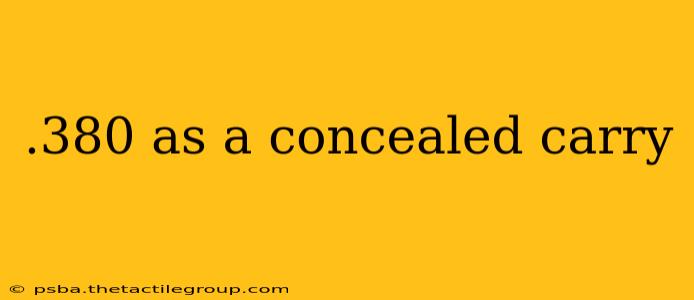The .380 ACP (Automatic Colt Pistol) cartridge has steadily gained popularity among concealed carry enthusiasts. Its smaller size and manageable recoil make it a compelling choice for individuals seeking a less powerful, yet still effective, self-defense round. This guide delves into the advantages and disadvantages of choosing a .380 for concealed carry, helping you make an informed decision.
Advantages of a .380 ACP for Concealed Carry
-
Reduced Recoil: The .380's lower recoil is a significant advantage, especially for individuals with smaller hands or less shooting experience. This manageable recoil contributes to faster follow-up shots and improved accuracy, crucial in a self-defense situation.
-
Lightweight and Compact: .380 pistols are typically smaller and lighter than their 9mm counterparts. This translates to easier concealment, making them ideal for everyday carry in various situations. The reduced weight also contributes to less fatigue during extended periods of carry.
-
Easy to Conceal: The compact size and lightweight nature of .380 handguns make them easily concealable under clothing. This is a crucial factor for those prioritizing discretion and comfort while carrying a firearm.
-
Lower Cost: Generally, .380 ammunition is less expensive than 9mm or other larger calibers. This translates to lower training costs and more affordable practice sessions, which are essential for maintaining proficiency.
-
Increased Magazine Capacity: While smaller than 9mm, advancements in firearm design allow many .380 pistols to offer surprisingly high magazine capacities, providing a greater number of rounds available in a self-defense situation.
Disadvantages of a .380 ACP for Concealed Carry
-
Reduced Stopping Power: Compared to larger calibers like 9mm or .45 ACP, the .380 ACP has less stopping power. This means that while it can effectively incapacitate an attacker, it might require more accurate shot placement and potentially more rounds to achieve the same effect.
-
Limited Availability of High-Quality Ammunition: While readily available, the selection of high-quality, self-defense .380 ammunition might be slightly more limited compared to larger calibers. It's crucial to select ammunition known for reliable performance and expansion.
-
Penetration: The .380's smaller size and lower energy can result in reduced penetration, particularly through barriers like clothing or car doors. This factor should be carefully considered when making your choice.
Choosing the Right .380 for Concealed Carry
Selecting the ideal .380 for concealed carry involves careful consideration of several factors:
-
Ergonomics: The pistol should fit comfortably in your hand, promoting a natural grip and improved accuracy.
-
Reliability: Choose a firearm known for its reliability, ensuring consistent function under stress. Read reviews and consider the manufacturer's reputation.
-
Features: Consider features like night sights, a good trigger, and ambidextrous controls based on your individual preferences and needs.
-
Ammunition Selection: Research and choose self-defense ammunition known for its reliable expansion and penetration characteristics.
Conclusion
The .380 ACP can be an effective choice for concealed carry, especially for individuals prioritizing lightweight and easy concealment. However, it's crucial to understand its limitations regarding stopping power and penetration. Careful consideration of the advantages and disadvantages, coupled with thorough research into specific firearm models and ammunition choices, will help you make an informed decision that best suits your individual needs and circumstances. Remember to always prioritize safety and undergo proper training before carrying a concealed firearm. This information is for educational purposes only and does not constitute professional firearms advice. Consult with a qualified firearms instructor and your local legal authorities before making any decisions regarding concealed carry.

